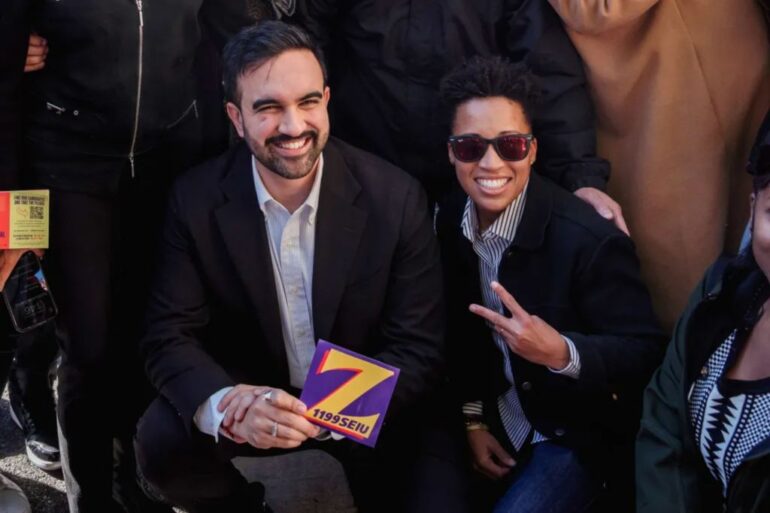🔴 Website 👉 https://u-s-news.com/
Telegram 👉 https://t.me/usnewscom_channel
In January, both ends of City Hall will be under new leadership.
The voters chose Zohran Mamdani as the city’s next chief executive. He will run the mayor’s side of the oldest functioning City Hall in the country.
The members of the City Council, however, will elect a new speaker, who will lead the city’s legislature from the building’s opposite wing.
Ahead of that January vote, the neck-and-neck front-runners are Julie Menin, an Upper East Side establishment Democrat considered a relative moderate, and the progressive Crystal Hudson of Brooklyn, the mayor-elect’s ideological fellow traveler.
While not nearly as prominent as the mayor, the speaker holds significant power over the direction of the city government.
She or he decides which of the hundreds of bills pending in the council come before the body for a vote.
The speaker also appoints the chairs of the committees in which those bills originate, who have the power to oversee and investigate city agencies.
If Hudson is elected, she will bring up bills that advance the agenda of her progressive base.
For example, City Council leftists, including its Democratic Socialists of America (DSA) members, are determined to pass the Community Opportunity to Purchase Act (COPA).
This proposed local law would force any owner selling a building with three or more units to notify the city’s Department of Housing Preservation and Development and share information about the building’s finances before listing it for sale.
Owners would then have to give qualified nonprofits an exclusive 120-day window to make offers on the building — during which they’d be prohibited from selling to an individual or a “for-profit” entity.
Worse, the HPD commissioner can extend this period, placing even more pressure on financially strapped owners to sell to a nonprofit.
The measure may well be unconstitutional, but DSA-style progressives will deploy it to push favored not-for-profit companies — many of which depend on the council for funding — to become primary owners of city residential real estate.
Their misguided worldview assumes these quasi-governmental landlords are superior to the small, family-based businesses that own a large share of the outer boroughs’ rent-regulated multi-family buildings.
Under Speaker Hudson, a radical, anti-private property, anti-business measure like COPA is likely to reach the council floor.
She could also use her power to foist bad policy upon the mayor.
When Mayor Eric Adams refused to run the NYPD according to the progressives’ preferences, the council passed the How Many Stops law to require officers to fill out reams of paperwork describing their interactions with the public.
If, for example, Mamdani takes the advice of Police Commissioner Jessica Tisch and abandons his promises to disband the NYPD’s Strategic Response Unit and suppress its gang database, Speaker Hudson could push legislation that bans the unit and dismantles the database.
In doing so, she’d override the police commissioner and corner Mamdani between his ideological campaign promises and the real-life demands of public safety.
Only the speaker has the prerogative to prevent the worst bills from reaching a vote.
If she chooses not to, she can place the new mayor in a very difficult position — forcing him to choose between prudential governance, supported by a broad consensus, and the ideological dreams of his far-left allies.
Conversely, a Speaker Menin could bottle up the DSA’s legislative disasters, shielding the mayor from his own bad ideas and giving him the room he needs to govern in a more moderate and effective way.
Mamdani may already perceive the need for such a built-in check.
Not only has he retained Tisch, he has also refused to support City Councilman Chi Ossé’s primary bid against House Minority Leader Hakeem Jeffries (D-NY).
And in contrast to his aggressive victory speech, Mamdani’s visit with President Trump on Friday was remarkably measured, even genial.
The mayor-elect seems to understand that he can’t succeed amid ceaseless anxiety over public safety and in a perpetual war with non-DSA Democrats.
If he wants to be an effective mayor, Mamdani must transform himself from outside agitator railing against the system to a wise manager of that very system.
While Hudson appears to be his natural ally and ideological companion, Mamdani’s mayoralty could sink under the weight of an overactive, radical City Council that places him under constant leftist political pressure.
A partnership with the older, more experienced Menin — who, incidentally, is Jewish — would offer balance at the grand staircase that stands as the fulcrum between the two wings of City Hall.
With a race that can tip either way, the speakership will decide whether New York’s next mayor starts off on a steady footing — or begins to slip with his first step.
Christian Browne is an attorney and adjunct fellow at the Manhattan Institute, where John Ketcham is director of cities and a legal policy fellow.

